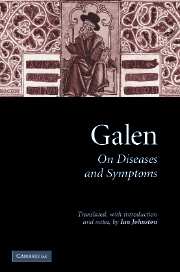Book contents
- Frontmatter
- Contents
- List of tables
- Acknowledgements
- List of abbreviations
- PART I INTRODUCTION
- I.1 General introduction
- I.2 Galen's life and works
- I.3 Galen's philosophical and medical antecedents
- I.4 Definitions and terminology
- I.5 The classification of diseases and symptoms
- I.6 Causation in diseases and symptoms
- PART II TRANSLATION
- PART III CONCLUSION
- Bibliography
- Index
I.1 - General introduction
Published online by Cambridge University Press: 22 September 2009
- Frontmatter
- Contents
- List of tables
- Acknowledgements
- List of abbreviations
- PART I INTRODUCTION
- I.1 General introduction
- I.2 Galen's life and works
- I.3 Galen's philosophical and medical antecedents
- I.4 Definitions and terminology
- I.5 The classification of diseases and symptoms
- I.6 Causation in diseases and symptoms
- PART II TRANSLATION
- PART III CONCLUSION
- Bibliography
- Index
Summary
Galen remains indisputably one of the major figures in the history of medicine, both occidental and oriental. Whilst his name may not evoke the undiluted reverence accorded to Hippocrates, he is a much more identifiable historical figure with a very substantial surviving body of work accepted as being from his own hand. In terms of influence, particularly in Western Europe, his position in medicine is somewhat akin to that of Aristotle in philosophy, characterized as it is by a dominance extending to the mid-point of the second post-Christian millennium. Unlike both Hippocrates and Aristotle, however, he has always had his share of detractors, in part a consequence of his combative and self-aggrandizing style of writing, in part because of his perceived arrogance, in part because during his lifetime he was a weighty participant in a continuing debate between conflicting schools on the theoretical bases of medicine, and in part subsequently because of the supposed stultifying effect of his ideas, seen by some as hindering further developments in medicine.
The merits of these and other criticisms are debatable. What is incontrovertible is that his writings were not only extensive in amount, but also wide-ranging in scope, embracing all aspects of theoretical and practical medicine and many areas of philosophy as well. Changing concepts of physiology and pathology may have vitiated many of his concepts and practices, but in their more theoretical aspects, his medical writings, and arguably his philosophical writings too, remain relevant.
- Type
- Chapter
- Information
- Galen: On Diseases and Symptoms , pp. 3 - 6Publisher: Cambridge University PressPrint publication year: 2006



